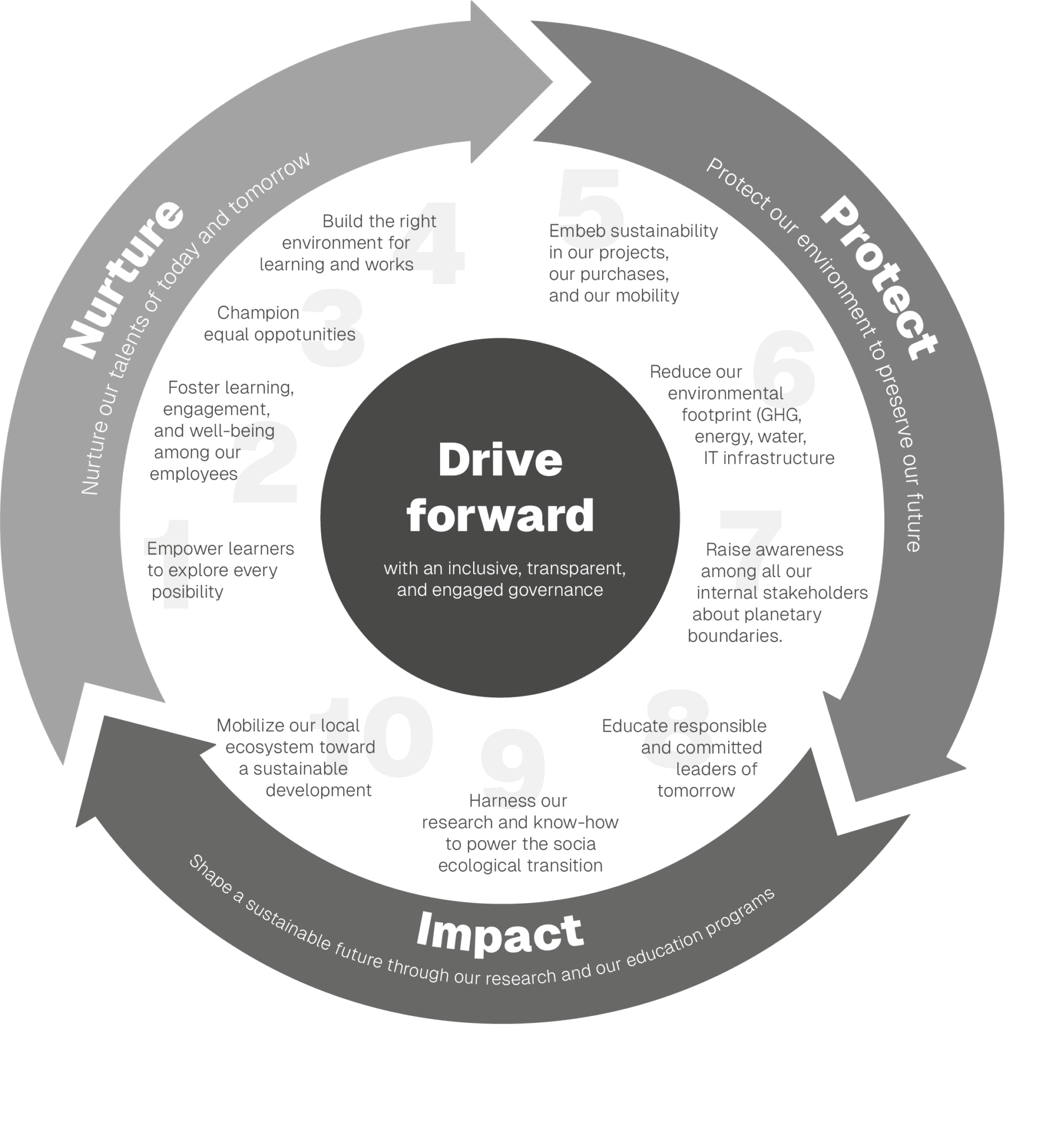

- Clermont School of Business
- International
- Study with us
- Programs
- Bachelor in International Management
- Bachelor in Digital Marketing & E-Commerce Management
- Master in Management
- Programme Grande Ecole online
- MSc – Master of Science Business Intelligence & Analytics
- MSc – Master of Science Corporate Finance and Fintech
- MSc – Master of Science Digital Marketing & Artificial Intelligence
- MSc – Master of Science International Commerce & Digital Marketing
- MSc – Master of Science Project Management
- MSc – Master of Science Procurement & Supply Chain Management
- Master of Business Administration (MBA)
- Doctorate of Business Administration (DBA)
- Executive Education (French only)
- Discover the Master in Management majors
- International Students
- Summer School
- Tools & pedagogical support
- Programs
- Faculty & Innovation
- Company & Career
- News & Events
Clermont School of Business: a renewed and shared SET strategy
Committed to a better world as outlined in its strategic plan “REVEAL 22-27,” Clermont SB adopted its first sustainable development and social responsibility strategy in 2022, supported by the DD&RS label. This initial milestone laid the foundations for responsible governance and quickly launched concrete actions. Three years later, the School has chosen to update its Socio-Ecological Transition (TSE) policy to make it clearer, better structured, and truly shared by the entire community.
A collective and structured approach
The initiative is based on the international ISO 26000 standard as well as the DD&RS framework, two references that ensure consistency and credibility. The School began by mapping its stakeholders (students, staff, alumni, associations, companies, funders, local authorities, etc.) and then launched a broad survey to identify the issues considered most important.
The results of this survey were translated into a materiality matrix, helping to prioritize expectations and guide strategic choices. At the same time, a benchmark was conducted with 31 higher education institutions and about ten universities, confirming the School’s desire to align with best practices in the sector.
A strategy built on three pillars: Protect, Impact, Nurture
The new strategy is now structured around three main pillars. The first, Protect, aims to reduce the School’s environmental impacts and integrate social and ecological criteria into its practices. The second, Impact, highlights the institution’s ability to transform society through its teaching, research, and regional engagement. Finally, the third, Nurture, reflects the will to care for the educational community—students, staff, and alumni—while promoting equal opportunities and talent development. These three pillars translate into ten priority commitments, covering issues from climate to equality, responsible digital practices, and quality of work life.

New bodies to drive and monitor change
To bring these ambitions to life, Clermont School of Business has redesigned its governance model. It now relies on a TSE department in charge of coordinating actions and managing a dashboard, as well as a transition committee bringing together staff, faculty, and students.
An advisory board, composed of representatives from the academic, economic, nonprofit, and institutional sectors, will provide external and strategic insight each year. In addition, a network of TSE representatives and ambassadors will be deployed across campuses and student associations, alongside thematic working groups already active on topics such as climate, equality, and responsible procurement.
The progressive implementation of this governance model should unfold over 6 to 10 months, with the first committees starting in the fall.

Our ambition is clear: to make Clermont School of Business a School that embodies the transition, not only through its internal practices but also through the impact of its teaching and research. We want every member of our community to identify with this approach and contribute to it in concrete ways. The socio-ecological transition cannot be carried by just a handful of people—it must be a collective endeavor.
Through this strategy, the School demonstrates a dual ambition: to transform its own operations and to contribute to building a more responsible society. An ambition that matches the ecological and social challenges faced today by higher education, as well as by all organizations.
Did you know?
Since 2022, the School has integrated the DDRS competency framework from the CDEFM into its curricula. At the same time, every department at the School aligns its actions with the objectives of the “REVEAL 22-27” strategic plan and reports its results annually to internal bodies, ensuring rigorous monitoring and a consistent trajectory. This monitoring is now supplemented by TSE-specific indicators, integrated into a dynamic and shared dashboard.
These include the reduction of greenhouse gas emissions, the share of responsible procurement, employee well-being, student engagement in impact-driven projects, and scientific output related to the transition.
Related with

Stay updated with the latest news from Clermont School of Business by subscribing to our newsletter!
Merci ! Vous êtes maintenant abonné(e) à notre newsletter.
Vous recevrez dorénavant notre newsletter mensuelle.
@bientôt
We faced problems while connecting to the server or receiving data from the server. Please wait for a few seconds and try again.
If the problem persists, then check your internet connectivity. If all other sites open fine, then please contact the administrator of this website with the following information.
TextStatus: undefined
HTTP Error: undefined
Some error has occured.



